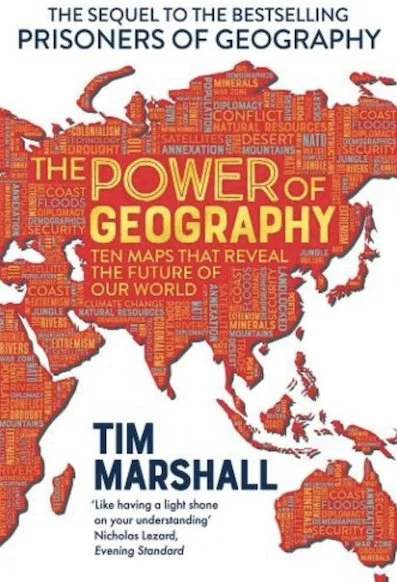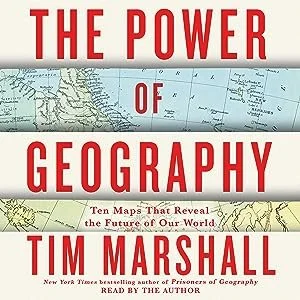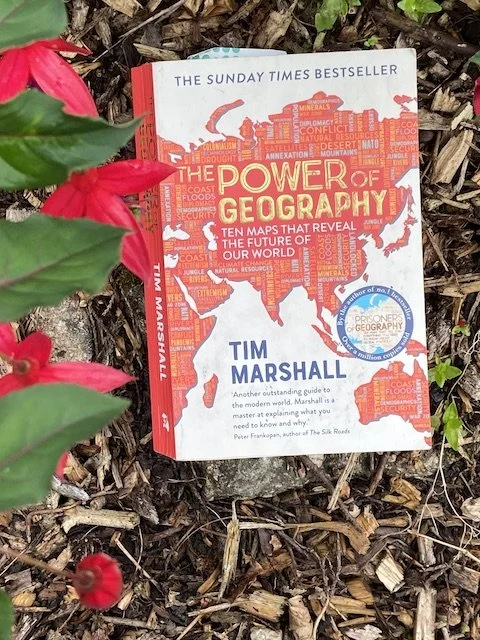The Power of Geography - Tim Marshall
In 'The Power of Geography' Tim Marshall takes ten countries and examines the role they will play in future global politics. As alliances shift and boundaries become frayed, this is a great book for explaining the backdrop to these tensions, and not just on terra firma but in the earth's orbit and beyond.
Prisoners of Geography
When Russia invaded Ukraine last year, the first book I reached for was 'Prisoners of Geography' for a quick geopolitical recap. In that book, Tim Marshall was excellent at providing a concise summary of the history of the region, and the intentions of the Russians.
When I was a child, one of my favourite books was an atlas. It was A3 size, and I used to pour over it for hours. Not only the countries and oceans and mountains but there was a section at the back with maps of city centres. I could spend hours looking at the place names, the road networks, and the city plans. And it continues with this book, with its very satisfying maps of borders and geographical features.
Indeed, if you're anything like me you'll enjoy looking at the maps in each chapter, and for that reason I would recommend buying a physical copy of the book. Thankfully it's not A3 sized but big enough to show the relevant countries, their borders and the mountains and rivers that form their geography.
The Sahal
That book was released in 2016, and geopolitics is constantly evolving, so this is a look at some other countries, including Australia, Spain, the UK, and interestingly, the Sahal region of Africa. Only this week, Niger was on the news after a military coup and I was already familiar with the region after reading this fascinating chapter - the country is the 4th largest exporter of uranium, which fuels the French nuclear industry, keeping the lights on in people's homes. Instability also threatens the region, in the form of jihadist groups, and the Russians and Chinese are always circling, seeking influence. It's also from this region that next major refugee crisis could arise.
It's a well-researched book, but you never feel overwhelmed by the facts or details. Each chapter is the same, with Tim Marshall taking each region, looking at its history, the importance of its geographical position, and the role it may play if there is a larger world conflict. It's always readable and full of interesting information, if not a little terrifying. Conflicts could flare up at any amount of pinch points.
China
I felt better informed after reading ''The Power of Geography'. I hadn't thought of the implications for Saudi Arabia as the world moves to renewable energy resources, and how should Australia face the growing threat of China. Indeed, China and its desire for growing influence in the world, especially among developing countries, is a constant theme. It made me think of Napoleans's words 'Let China sleep; for when she wakes, the world will tremble.'
The section on Space is a fascinating one, with the moon and various meteorites looking like prime pieces of real estate. But it's also pretty depressing, as rather than cooperating in space for humanity's benefit, countries are looking to hoover up resources for their own use. Indeed, by controlling the low earth orbit, countries could gain a huge military advantage. Astropolitics will become important in the future.
The Power of Geography Summary
Marshall is an engaging writer and can describe the complexities of international geopolitics in an engaging and accessible way. I felt better informed after reading ''The Power of Geography' and in a world where we are surrounded by false news and blowhards on social media, I trusted Tim Marshall to give me an accurate summation of the 'power of geography' in the world. Interesting times ahead, no doubt, and this will be the book I'll be reaching for.
352 pages, Paperback
Published January 1, 2021 by Elliott & Thompson Ltd




